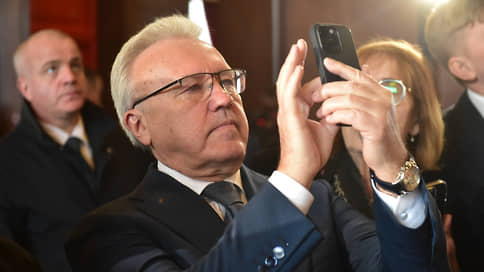Former Krasnoyarsk governor Alexander Uss returned to the Federation Council
[ad_1]

The Legislative Assembly of the Krasnoyarsk Territory delegated the former governor Alexander Uss to the Federation Council (SF). To do this, his colleagues in the “United Russia” successively gave him two mandates: Deputy of the Legislative Assembly Nikolai Kreminsky and Senator Valery Semenov. During the meeting, it turned out that President Vladimir Putin personally invited the ex-governor to return to the Federation Council after 21 years, which, however, did not protect him from criticism from some deputies.
The issue of electing a new senator from the Legislative Assembly of the Krasnoyarsk Territory was considered at the June 8 session. Nominated Alexander Ussa for this position “United Russia” (ER).
Alexander Uss is a veteran of Krasnoyarsk politics, who previously sat in the Federation Council twice. In 1993, he passed to the upper house from the Evenk dual-mandate district (the first convocation of the Federation Council was elected), and in 1998 he became a senator ex officio – already as chairman of the legislative assembly of the region (the second convocation of the Federation Council was formed from governors and speakers). From 2002, when senators began to be delegated, and until 2017, Mr. Uss led the regional parliament, and after the resignation of Governor Viktor Tolokonnikov, he took his place.
After serving one term, on April 20, 2023, now Mr. Uss himself ceded the leadership of the region to Deputy Finance Minister Mikhail Kotyukov. On the same day, Mr. Uss said that “the other day” he had a meeting with Russian President Vladimir Putin, at which he received an offer to work at the federal level. The executive power of the Krasnoyarsk Territory in the Federation Council is represented by the head of the Committee on Constitutional Legislation Andrey Klishas. To get the seat of a senator from the legislature, Alexander Uss needed a deputy mandate, as well as the voluntary resignation of the current representative of the regional parliament in the Federation Council. There were no problems with this: on May 16, deputy Nikolai Kreminsky resigned, and on May 24, Senator Valery Semenov (both representatives of United Russia) followed his example. On May 31, it became known that the regional branch of the ruling party sent for approval a proposal to delegate Mr. Uss to the Federation Council to the General Council of United Russia.
At the session on June 8, the speaker of the Legislative Assembly, Aleksey Dodatko, suggested “not to cast a shadow on the wattle fence” and explained this combination by the will of the top leadership: “We discussed together how best to implement the proposal of the country’s leadership to continue the work of Alexander Viktorovich at the federal level.”
According to Mr. Dodatko, the solution found speaks of the “political maturity” of all the castling participants and the “prevalence of state interests over private ones.”
The ex-governor himself clarified, saying that the president personally invited him to become a senator. “In the final conversation (at the meeting on April 20.— “b”) I was told that it makes sense for me to remain in politics and, moreover, to represent the region in the Federation Council. Naturally, such proposals are not refused. Uss clarified that he asked the president to “take into account the interests of colleagues as much as possible” who are affected by the rotation, and this request was fulfilled: Valery Semenov was appointed Deputy Acting Governor Mikhail Kotyukov, and Nikolai Kreminsky remained in the Legislative Assembly as an adviser to chairman Alexei Dodatko.
Before the vote, the LDPR faction suddenly proposed to put on the ballot the vice-speaker of the Legislative Assembly, Sergei Natarov, who is accused of embezzlement and is in jail, and thereby show him “mercy and compassion” (the party hoped that such an appointment would save their colleague from criminal prosecution) . But it immediately became clear that the nomination of a candidate must be accompanied by the provision of a whole set of documents, and the LDPR did not fulfill this condition.
The deputies who spoke in support of the ex-governor said that he “has developed such a scale of personality that there are no doubts about his professionalism,” and his “most important quality is patriotism and love for the Krasnoyarsk Territory.” But it was not without criticism.
Irina Ivanova (The Greens) drew the attention of her colleagues to the number of representatives of the region’s leadership who have become defendants in criminal cases lately: “This is the personal responsibility of the governor for the persons whom you brought to govern our region.”
Recallin relation to the ex-head of the Krasnoyarsk government Yuri Lapshin, a case of abuse of power (Article 286 of the Criminal Code of the Russian Federation) is being investigated, the former Minister of Transport Konstantin Dimitrov is under a similar article, and the general director of the regional Overhaul Fund Mikhail Popelyshev is suspected of especially large-scale bribery (part 6 article 290 of the Criminal Code of the Russian Federation).
Responding to the criticism of Mrs. Ivanova, Alexander Uss called for the presumption of innocence, adding that this problem is also relevant for other regions. As a result, 39 out of 44 deputies who attended the session voted for him. Four voted against, one ballot was invalid. “I will try to work for three years with dignity, and then may God give us all happiness and health. You will come to the new parliament (the next elections should be held in 2026.— “b”), me too, and you will change your mind and once again vote for me as a future senator,” Alexander Uss predicted, responding to a remark from one of the deputies.
[ad_2]
Source link








